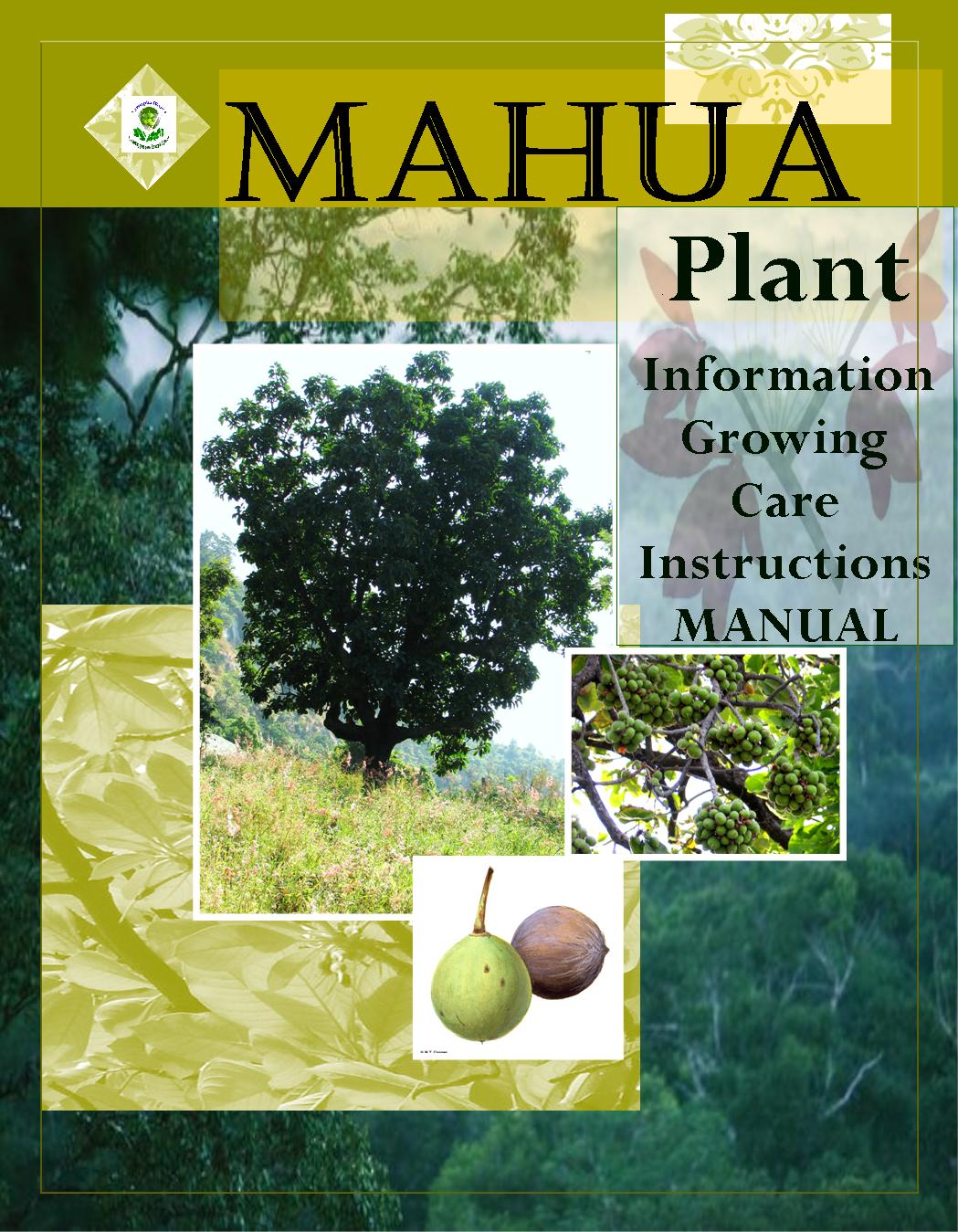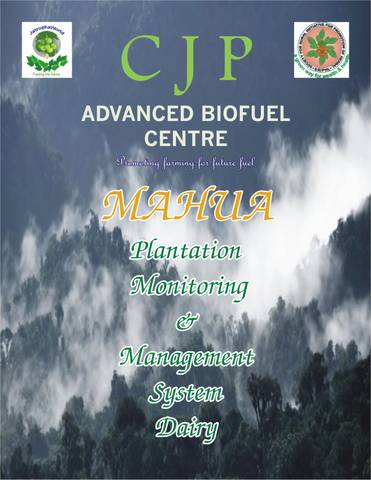 |
|
|||
|
|
| |
 |
|
Mahua :Madhuca indica A NEW SOURCE OF BIODIESEL Mahua (Madhuca indica) is one of the forest based tree-borne non-edible oils with large production potential of about 60 million tons per annum in India. Virtually being the lifeline of tribal belt in central India, the tree is culturally most identified with Indian life in the plains. Its flowers are sweat, delicious and are consumed besides tasty fruits. But the tree wins in fame due to the liquor distilled from the flowers, which are used to make vinegar. The seeds yield fat known as Mahua butter used in cooking, adulteration of Ghee, manufacturing chocolates and even soaps, besides treatment of rheumatism and constipation. Mahua cake is insecticidal and also used for fishing. The timber is useful variously but neglected. The mahua tree belongs to the genus Mahuca. The tree, its seed and flowers have been very useful in Indian economy for a long time. The flowering season extends from February to April. It is rich in sugar (73 %) and next to cane molasses; it constitutes the most important raw material for alcohol fermentation. The yield of alcohol is 405 litres from one tonne of dried flower. The kernel of the mahua fruit contains about 50% oil. The oil yield is 34-37% by small expeller. The expelled cake is relevant to recover the residual oil. Fresh oil is yellow in color, while commercial oil is generally greenish yellow with disagreeable odour and taste. As this tree grows mainly in forest area and also in waste and fallow land, its cultivation would not produce any impact on food production but would in long way improve the environmental condition by massive aforestation.
Considering Mahua’s potential as an oilseed feedstock for biodiesel CJP has honor to establish this untapped resource as alternative source for Bio- Diesel industry of future. About the Plant The two major species of genus Madhuca found in India are Madhuca Indica (syn. Bassia latifolia) and Madhuca longifolia (syn.Brassica longifolia). Mahua is the widely accepted as local name for the fat from both these species. M. Latijolia is a deciduous tree while M.Congijolia is ever green or semi ever green tree. Attains height up to 70 ft. The tree matures and starts bearing 8 to 15 years, and fruits up to 60 years. The two species are not differentiated in Trade. The kernels are 70% of seed by weight, are seed contains two kernels, having 2.5 cm x 1.75 cm size oil content in latifolia is 46% and 52% in longifolia. In seeds oil content is +35% and protein in 16%. BOTANICAL FEATURES BOTANICAL NAME: Madhuca indica FAMILY: Sapotaceae Common Names Sanskrit: Madhuka A.P : Ippe, Yappa Gujarat: Mahuda Hindi: Mahua, Mohwa, Mauwa Karnataka: Hippe Kerla: Ponnam, Ilupa Maharashtra: Mahwa, Mohwra Orissa: Mahula, Moha, Madgi Tamil Nadu : Illupei, elupa West Bengal: Mahwa, Maul, Mahula English: Butter tree A deciduous tree, 10-15m tall and with a spreading, dense, round, shady canopy. Bark is rough, brown in color, slightly cracked and fissured, inner bark red, exudes white, milky sap when cut. Leaves elliptic, 15-25 x 8-15cm, tip pointed, base angled, texture thick, hairy beneath, nerves strong, about 12 pairs, tertiary nerves oblique, and margin entire but may be wavy. Stalk 2-4cm, reddish. Flowers in bunches at the end of the branches, white, 2cm long, pointed, sweat scented, fleshy. Fruits ovoid, fleshy, 2-4cm across, greenish, 1-4 seeded. Seeds elongate, 2 cm long, brown shining. FLOWERING The flowering season extends from February to April. The copious fall of succulent, corollas weave a cream colored carpet on the ground. It is rich in sugar (73%) and next to cane molasses constitute the most important raw material for alcohol fermentation. The yield of 95% alcohol is 405 liters from one tonne of dried flowers. FRUITING The matured fruits fall on the ground in May and July in the North and August and September in the South. The orange brown ripe fleshy berry is 2.5 to 5 cm long and contains one to four shining seeds. The seeds can be separated from the fruit wall by pressing. Drying and decortications yield 70% kernels on the weight of seeds. HABITAT & DISTRIBUTION Mahua is a frost resisting tree of the dry tropics and sub-tropics, common in deciduous forests and dry sal plain forests. The tree is usually found scattered in pastures and cultivated fields in central India. It is extensively cultivated near villages. Madhuca latifolia is a medium sized to large deciduous tree, distributed in Andhra Pradesh, Gujarat, Madhya Pradesh, Orissa, Bihar and Uttar Pradesh. Climate It performs well in the areas with rainfall between 800-1800 mm. Soil It is a tree of dry tropical and subtropical climate. The tree grows on a wide variety of soils but prefers sandy soil. It also performs in alluvial soil.
Biophysical limits Altitude: up to 1 200 m Mean annual temperature: 2-46 deg C Mean annual rainfall: 550-1 500 mm Soil type: M. latifolia grows best in deep loamy or sandy-loam soils with good drainage, it also occurs on shallow bouldery, clayey and calcereous soils. Mahua Agronomy PLANTATION TECHNOLOGY One of the few trees that may not need deliberate conservation efforts due to its assimilation in cultural identity. In the tribal belt the center of the village is usually adorned with a huge Mahua tree, beneath which all the village meetings are held. Regeneration is plentiful. The tree is rarely cut due to its economic importance and religious taboos threatening wrath of the spirits upon cutting the trees. The productive plantation of M.Indica needs to be scientifically managed for better growth and production. The growth and yield of the plant could be improved through effective management practices. The enhanced cultivation technology and improved inputs developed by CJP may provide about 4-6000 liters of fuels without displacing food crop and without utilizing prime food land in terms of sustainable farming techniques The key factors that can influence the oil yield of M.Indica are:
CJP carefully manages Madhu Indica cultivation, with advanced crop practices suitable to local soil, weather, pest, and disease conditions to ensure the high amount of oil as we have developed enhanced technology with regards to:-
The key factors governing profitability of large scale production are:
Madhuka Indica (Mahua) Crop Information Growing & Care Instruction Manual and Monitoring & management system The planting, looking after and harvesting plants is an important factor and it requires a lot of knowledge, skill and techniques viz: the best planting season to make the plant early matured, then an amount of seeds to be planted, an irrigation & fertilization method, a control method of weeds , investigate quality, yield, and degree of occurrence of several troubles . As all biological organisms require care and attention, the need to draw Growing Instructions was being felt by all concerned Therefore keeping in view Various concerns and problems of a new Grower; CJP being “The Centre of Excellence” has designed Madhuka Indica Growing & Care Instructions Manual with Monitoring & Management System Diary on the basis of our own tried, tested, developed and experienced Plant Propagation and Cultivation Technologies and Practices to help you grow a Failsafe Mahua Fuel Farm The Madhuka Indica Growing & Care Instructions manual provides basic guidance for the project developers to help ensure successful Madhuka Indica planting projects. Proper planning, planting and maintenance are the key for growing flourishing plants. Simply putting a plant in the ground is not enough. Careful thought must be given to the purpose of the planting, location of the planting and how the Madhuka Indica will be cared for once they are in the ground. A properly planted and maintained plant will grow faster and live longer than one that is incorrectly planted. This booklet is organized as a step-by-step checklist of fundamentals to help you with your Madhuka Indica planting project We have sincerely tried to put all steps in nutshell and hope it will be a useful tool in growing your Biodiesel Plantation Both the Madhuka Indica publications are available Order Just Know Agricultural Extension Kit CJP has specifically developed and designed a unique kit for Madhuka Indica plantation and crop care for 1 hectare called: “Agricultural Extension Kit” – a key to your fuel farm “just enables & encourages the farmers/ new growers to start the Biodiesel crop cultivation in a right and prefect manner by adopting the concept of “sustainable agriculture”. Madhuka Indica Starter Kit: Mahua Agri- Extension Kit contains
ASK FOR A QUOTE Elite Mahua Seeds
TERMS & CONDITIONS Packing: 2,10,20,50 KG Bags Shipment: FOB/CIF Minimum QUANTITY: 3.0 tons by sea, 2 kg by air PRICE: quote? Working time: 30 days After Payment ALL PAYMENT TERM:100 % Advance Phyto sanitary charge: included ASK FOR A QUOTE An Economic Evaluation of Mahua Plantation M.Indica: An untapped fuel tree The M.Indica biodiesel meets all the three criteria any environmentally sustainable fuel must meet. These are social, technical and commercial. About 30-40 percent of the tribal economy in north India such as in Bihar, Madhya Pradesh and Orissa is dependent on the mahua seeds and flowers. The tree has a potential of enhancing rural income. Being an evergreen variety, it reaches a height of 45-60 feet, and is well adapted to varied weather conditions. With its wide spreading branches and circular crown the tree presents a visually appealing structure. Though the tree starts bearing seeds from the seventh year of planting, commercial harvesting of seeds can be done only from the tenth year Seed yield ranges from 20-200 kg per tree every year, depending on its growth and development. Being hardy and pest resistant, the tree requires little attention once it has taken root. The variety latifolia is common throughout the Indian sub-continent. As a plantation tree, mahua is an important plant having vital socio-economic value. This species can be planted on roadside, canal banks etc on commercial scale and in social forestry programmes, particularly in tribal areas. The drying and decertification yield 70% kernel on the weight of seed. The kernel of seed contains about 50% oil. The oil yield in an expeller is nearly 34-37. The properties of the MI Oil were found to be within the biodiesel limits of various countries. Hence the MI Oil can be used as a substitute for diesel, for sustainable development of rural areas and as a renewable fuel. The trees will act as sinks for carbon dioxide and, hence, the M.Indica plantation will reduce the amount of this greenhouse gas (GHG) in the atmosphere. The project has many other positive economic, social and environmental impacts: There are income generation opportunities that result from the project like the provision of goods and services to the plantation and its workers. THE POTENTIAL RETURNS
Yield is a function of light, water, nutrients and the age of the Plant. Good planning, quality planting material, standardized agronomy practices and good crop management may handsomely increase the yields. M.Indica will yield at Maturity as high as +3 tons oil with proper nutrition, and irrigation. This is truly an exceptional amount of oil from an agricultural crop. Under CJP’S Couple Crop Technology oil production to the tune of 6000 kg per ha is obtainable
For detailed cost benefit ratio obtain MADHUCA INDICA BIODIESEL BUSINESS PLAN MADHUCA INDICA BIODIESEL BUSINESS PLAN Sample/ Ready Built Business Plans
Sample/ready built Biodiesel business plans are drawn in universal scenario based on optimum conditions for growing the biodiesel crop worldwide and on crop specific science, agronomy and economy in wider context
Sample/readymade business plan are available for 20 hectare, 100 hectare and 500 hectare as per details on page http://www.jatrophaworld.org/biodiesel_business_plan_95.html
Feasibility Study Report
We recommend carrying out Feasibility Study Report for project size of 5000 hectares or more to determine the land identification and suitability of growing the Madhuca Indica
Customized, Complete & Comprehensive Biodiesel Business Plan
We make the integration of our experience, expertise and professional knowledge with your information and formulate customized biodiesel business plan. In undertaking this Technical & Financial Inputs assessment, we shall have relied on Primary inputs supplied by you, our IPR knowledge & research experiences and expertise in the field; on industry experts and secondary information derived from recognized public sources and via CJP's database and multi-client reports.
For formulation and creation of customized Madhuca Indica biodiesel business plan for the size of 1000 hectare or more kindly contact to Director Business Development for detailed quote for Madhuca Indica : the 2ndgeneration biodiesel crop
CJP can help clients identify the needs, opportunities and solutions of their local, regional and national markets. By identifying these needs and providing management direction, CJP can help in creating a perfect business plan in order to develop and manage an effective and successful biodiesel facility. The most critical component of any business plan is the pro forma, an educated view or projection of what the performance of a company is capable of, given a specific set of assumptions and conditions. CJP has been involved in identifying these needs for specific projects for a number of years and can help develop a realistic and obtainable: Income Statement Balance Sheet Capital Budget Cash Flow Break-even Analysis Sensitivity Analysis Assumptions Governing the Projections These projections will be valuable in determining feasibility of the project, securing financing, attracting investment and guiding management so that the company can reach its full potential.
For a detailed quote for a complete and comprehensive Madhuca Indica Biodiesel Business Plan from Farming to fuel, kindly mail to jatrophaplan@gmail.com or contact Director Business Development Division, CJP |
||||||||||||||||||||||||||||||||||||||||
© 2004- 2025 ABC-Advanced Biofuel center ,, All Rights Reserved |


 CJP’s Researchers have developed
standardized techniques for growing
CJP’s Researchers have developed
standardized techniques for growing